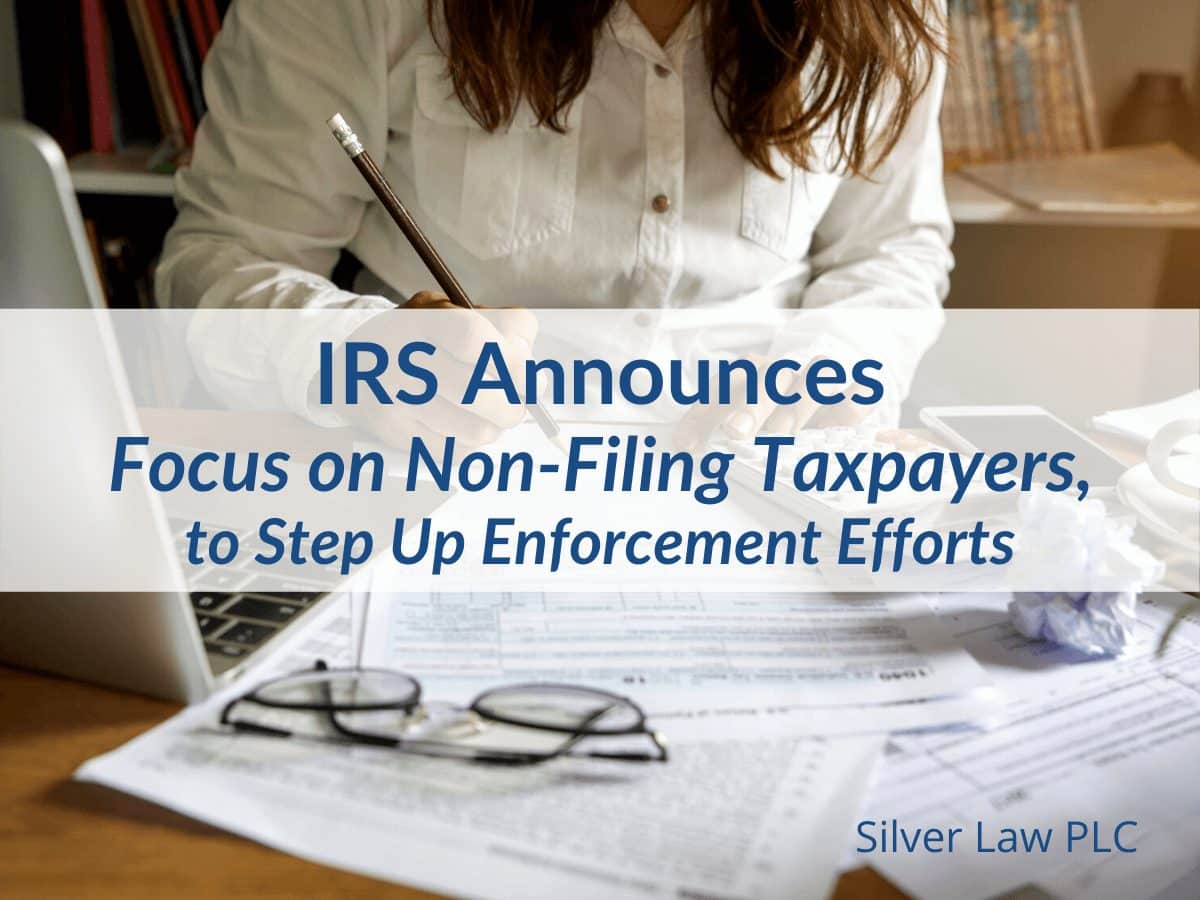IRS Revised Guidelines Offshore Voluntary Disclosure Program On June 18, 2014, the IRS issued revised…
IRS Announces Focus on Non-Filing Taxpayers, to Step Up Enforcement Efforts
The IRS is using more tools at its disposal to focus on those taxpayers who are not filing their annual tax return. Specifically, the agency will be focusing on high-earning taxpayers who have not filed a return in recent years.
Recently, the IRS has hired more enforcement personnel, known as revenue officers (RO), who visit taxpayers in person to discuss tax issues, such as failure to file a return or suspected errors on returns. The revenue officers will review the responsibilities of the taxpayer with them and help them understand what they need to do to come into compliance. If you find yourself involved in any dispute don´t hesitate to contact one of our Arizona Tax Litigation Lawyers.
The IRS said that it will be increasing visits from revenue officers, as well as using data analytics and research to identify delinquent taxpayers and to improve collection efforts.

Identifying an IRS Revenue Officer
To ensure that taxpayers know that the person who arrives at their home claiming to be a revenue officer truly is an agent of the government, the IRS has issued some guidelines for identifying official revenue officers. The IRS has said that revenue officers will:
Provide two forms of credentials with a serial number and a photo of the employee. If the person does not automatically produce these credentials, you should ask to see them.
Explain the tax liability and the consequences for failing to comply. Revenue officers will not threaten or harass taxpayers, nor will they demand unusual payment.
Will request payment for the clearly outlined tax liability and will provide a variety of payment options. Checks should always be made payable to the U.S. Treasury.
Typically, a revenue officer will show up without scheduling anything with the taxpayer or letting the person know that they are going to visit. However, the IRS will usually have sent multiple letters and made multiple phone calls to the taxpayer before a revenue officer conducts an in-person visit. Luckily our Arizona tax controversy attorneys have experience in the Arizona civil tax litigation and are prepared to help in these situations.
Other Enforcement Efforts
In addition to sending out revenue officers for face-to-face visits with delinquent taxpayers, the IRS is also using other methods to bring them into compliance.
The agency has revised the way it identifies delinquent taxpayers and creates cases for them to improve identification of both individual and business taxpayers who have not filed a return. The system for referring these people to the appropriate officials has been revised for improved results.
The IRS will also be using its Automated Substitute for Return program (ASFR), which identifies potentially delinquent taxpayers based on their previous filings. If someone filed previously but didn’t the following year, the system would flag them. The IRS would then notify these people so they could correct the problem quickly.
It will also use its Delinquent Return Refund Hold program (DRRH) to hold back a tax refund if there is an unfiled return within the previous five years. The program is designed to encourage taxpayers to meet their tax obligations for each year.
Finally, the IRS will use the automated 6020(b) process to identify business taxpayers who have not met their employment tax requirements.
Resolving Tax Liability
The IRS encourages taxpayers who have been contacted by a revenue officer or who have not filed a tax return to meet with an Arizona tax collection lawyer to learn about their rights and responsibilities. The IRS can use a number of options to enforce payment of tax liabilities it has identified, such as garnishing wages and even pursuing criminal charges.
If you have been contacted by the IRS about a potential tax delinquency or other tax issue, it is important that you take action quickly. The longer you wait, the more interest and penalties could be piling up. You cannot just ignore the issue if you think that there has been a mistake. You must address it and clear it up.
The Phoenix tax attorneys at Silver Law PLC are ready to help you if you have been notified by the IRS that you have a delinquency or if you know that you haven’t filed a previous return and need to do so. We’ll help you understand your options for meeting your obligations while also minimizing your tax debt or penalties as much as possible. If you have civil or criminal charges pending against you, we can also represent you on those. Call us in Arizona today to talk with an experienced tax attorney about your options.
Silver Law PLC
Arizona Location
7033 E. Greenway Pkwy, Ste 200
Scottsdale, AZ 85254
Office:480-429-3360
Email: lchapman@silverlawplc.com
Website: taxcontroversy.com
Nevada Location
410 South Rampart Blvd, Suite 390
Las Vegas, Nevada 89145
Office: 702-318-7130
Email: lchapman@silverlawplc.com
Website: taxcontroversy.com
















Leave a Reply
You must be logged in to post a comment.